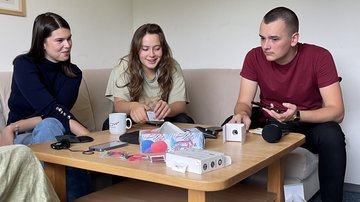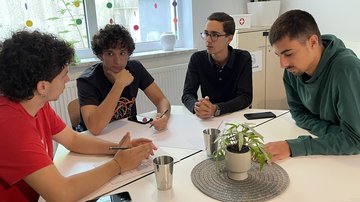Against forgetting - The Heritage of the Nuremberg Trials
Against forgetting - The Heritage of the Nuremberg Trials
Six youth exchanges in six countries form the core of the project ‘Against Forgetting’, funded by the CERV programme of the European Commission. One of these took place in Franconia with participants from Bosnia and Herzegovina, Great Britain, Italy, Poland, Romania, Slovenia and Germany. The focus was on Nazi crimes, international criminal law and today's Europe.
The group of young people who came to a workshop at the Memorium Nuremberg Trials is as colourful as Bartosz's cloth bag. From November 1945 to October 1946, representatives of the Nazi regime had to answer to an international military tribunal in the historic courthouse. The Nuremberg follow-up trials also took place here until 1949.
Learning for the future
Today, this historic site houses a museum. A permanent exhibition provides information about the trials, which represented an innovation in international criminal law and paved the way for the International Criminal Court in The Hague. Armed with pen and paper, the 15- to 24-year-olds browse through the exhibition rooms, gathering information for a history bingo game. Afterwards, they discuss their findings and exchange insights.
Is history still relevant for young people today? “I am convinced that history is the way to learn for the future,” says 15-year-old Stella from Berlin. "I wouldn't say that history repeats itself. But there are patterns that you can recognise and that recur again and again. Especially in times like these, when the AfD is gaining ground, when people are starting to downplay or deny the Holocaust, when propaganda is becoming stronger and spreading on social media, it's important to look at history: How did it work back then? And how can we prevent it?"
Raising awareness
Bartosz, an 18-year-old from Poland, also believes it is important to understand historical contexts: “Today, it is entirely possible that countries could find themselves at war again. You have to know how to behave.” Team member Amelia adds: "I think it's necessary to remember the past. Although we are taught about all eras at school, I have the impression that it's simply not enough."
Tea, a 23-year-old from Slovenia who is also accompanying the exchange as a team member, wants to raise awareness in society. “Although the Nuremberg trials took place and the International Criminal Court was established, war crimes are still being committed,” the law student points out. “We still haven't learned from what we've seen. We must continue to inform people about it.”
Roses in remembrance
After visiting the ‘Memorium’, the group makes its way to Nuremberg's South Cemetery. There lie war dead from both world wars, including victims of Nazi persecution and extermination: over 5,000 forced labourers from Southern and Eastern Europe and 3,500 Soviet prisoners of war. The young people explore the war cemetery, deciphering names on weathered gravestones. At the end, the group gathers together: Bartek and Antonina take turns reading the words of remembrance. Then everyone lays down a rose – a silent tribute at the grave of a person who died from malnutrition in the Langwasser camp, from the consequences of exploitation in forced labour, from bombs or shootings.
The evening belongs to the living: in small groups, the young people explore Nuremberg's old town. Between fast food and souvenirs, there is something for everyone. Shared experiences are very important. “Everyone gets along really well with everyone else,” says 20-year-old Mila from Saarland, describing the atmosphere. "No matter who you meet, no matter who you talk to: everyone is super nice and super open. It's really like you imagine it to be when you say you live Europe."
Exhibition and podcast
The following day begins with group work. During the six youth encounters of ‘Against Forgetting’, a joint exhibition and podcast are to be created – fed by the impressions and work results of the participants: multinational and multi-perspective. Stella, who is part of the podcast team, finds it particularly valuable to get to know the different narratives: “I find it exciting to have different perspectives in the group and the opportunity to exchange ideas.” The team interviews several group members for their podcast.
“This international youth exchange is really cool,” concludes Anne, an experienced group leader who manages the Nuremberg exchange. “It's wonderful to see that everyone here gets along peacefully, that they support each other, that they all have similar interests and are not enemies.”
Author: Christina Söder, English translation of the article “Europa leben: Against forgetting in Nürnberg”
Facts and figures regarding the youth exchange
- Dates and venue of the project: 25th August to 3rd September, 2025 - Oberschlauersbach/Nuremberg
- 29 participants from seven countries: Bosnia and Herzegovina, Poland, Great Britain, Romania, Italy, Germany and Slovenia
- Age: 15 to 24 years
- Programme highlights: Workshops and guided tours at the Memorium Nuremberg Trials documentation centre, at the documentation centre of the Nazi Party Rally Grounds, Human rights workshop, visit of the cemetery of forced labourers and prisoners of war, self-guided workshops about war crimes in the participants' countries, intercultural learning
- Cooperation partners: Education Builds Bosnia and Herzegovina - Jovan Divjak; National Youth Council of Slovenia; College of Eastern Europe; German War Graves Commission
- Funding: CERV-programme of the European Commission, Ministry of Youth Germany


